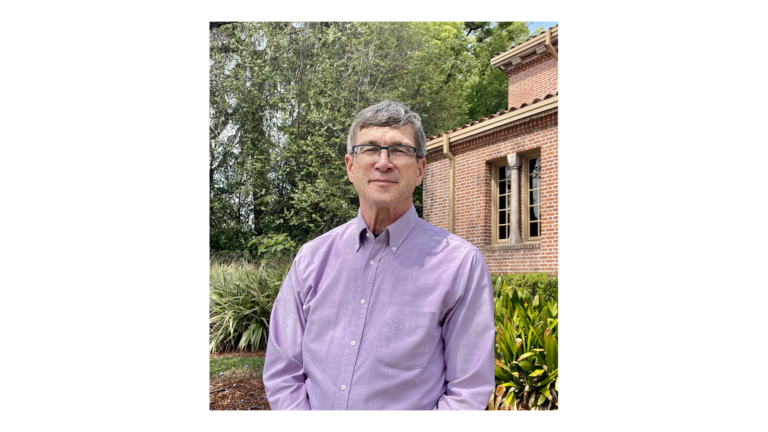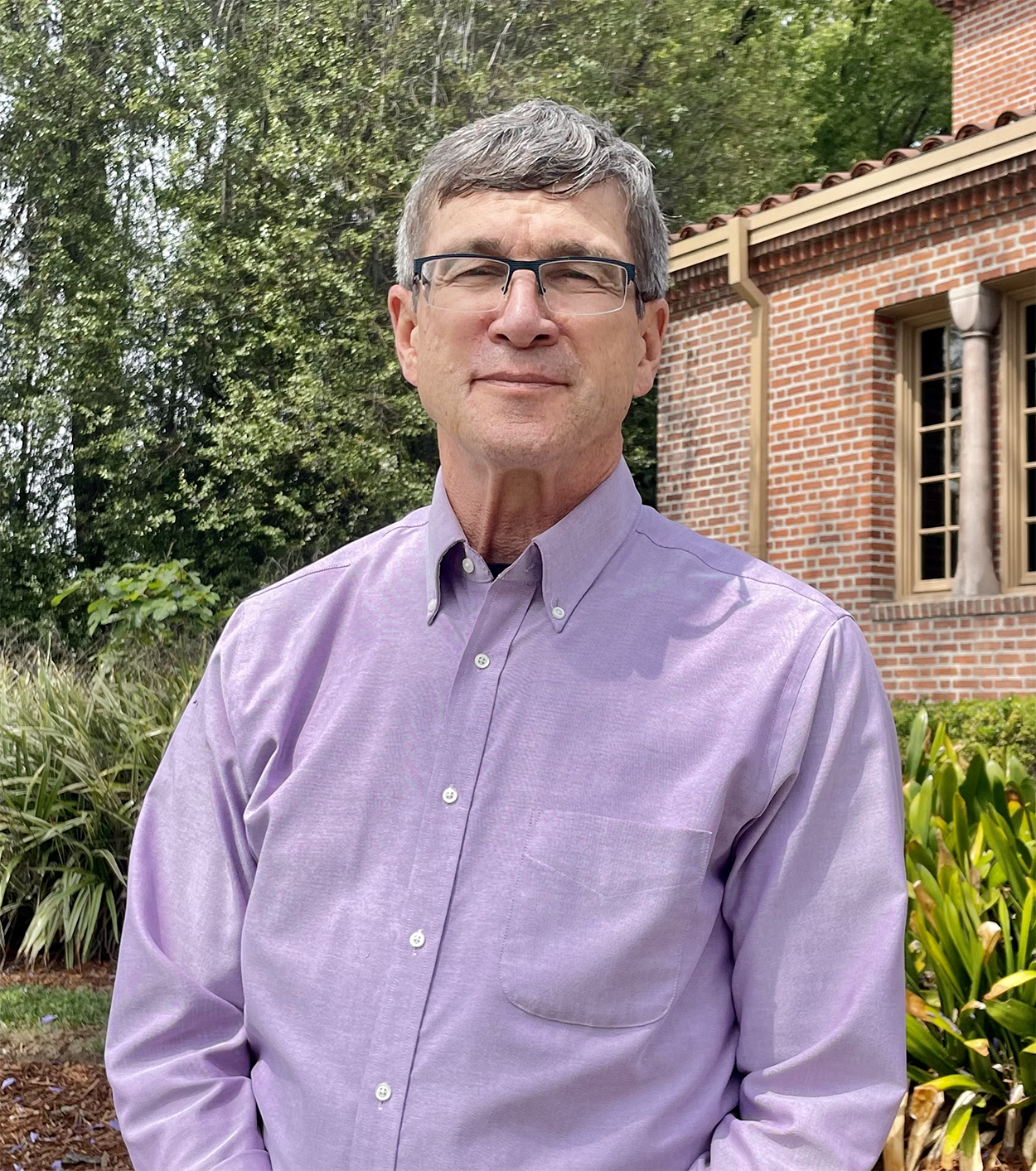
Scholar Q&A: IACS President Richard Wood
A renowned researcher and proven leader in higher education, Richard Wood, Ph.D., is the new president of the Institute for Advanced Catholic Studies at USC.
Dr. Wood joins IACS and the University of Southern California from the University of New Mexico, where he taught for 27 years as a professor of sociology and served as the founding director of the Southwest Institute on Religion, Culture, and Society. He also served as the university’s interim provost and executive vice president for academic affairs, and the senior vice provost for academic mission. In these positions, he oversaw the university’s academic priorities, led initiatives to advance equity and academic excellence, and achieved major fundraising goals.
Dr. Wood’s research and writing focus on the areas of religion and society, ethical democracy, faith-based community organizing and global sociology. At UNM, he taught courses on democracy and political culture, religion, Catholicism in Latin America, social theory, social movements, and community organizing.
Dr. Wood is the author of two award-winning books, both published by The University of Chicago Press: A Shared Future: Faith-Based Organizing for Racial Equity and Ethical Democracy and Faith in Action: Religion, Race, and Democratic Organizing in America. He has written dozens of articles for leading peer-reviewed academic journals, co-edits the Cambridge Studies in Social Theory, Religion, and Politics book series, and served as the principal investigator on four major federally-funded research projects.
His commentary has been featured in The New York Times, Washington Post, Associated Press, Albuquerque Journal and a variety of Catholic publications.
Dr. Wood earned a doctorate in sociology from the University of California, Berkeley, a master’s degree in theology from the Graduate Theological Union and a bachelor’s degree in chemistry from the University of California, Davis.
In the Q&A below, Dr. Wood discusses his work and the future of IACS.
IACS: What drew you to IACS?
Dr. Wood: Well, the theological answer to that, I would hope, is ‘the Holy Spirit.’ But that’s beyond our focus here, and in any case the Holy Spirit moves in concrete and worldly ways. It was the Institute’s mission that really called to me.
Ideas are what IACS is all about: we sponsor leading-edge research on important questions that matter for today’s world, whether those questions are about the Christian revelation, global justice, economic prosperity and democracy in America, the relationship between scientific understanding and spiritual insight, the role of beauty in our lives or Catholicism’s relation to other spiritual traditions.

The Institute’s intellectual work brings ideas alive for the Catholic Church and our society by drawing on Catholic intellectual currents in dialogue with other streams of thinking from secular science, the humanities and other religions.
In all that, ‘intellectual’ means the physical and biological sciences, human and social sciences, or humanities and the arts — all those are carriers of ideas that matter for our future. IACS strives to help Catholicism ‘think with humanity’ on all those terrains.
IACS: How has your experience prepared you for your new role?
Dr. Wood: I’ve lived most of my life in a way that is simultaneously deeply embedded in Catholic sacramental practice and very much at the contact point between Catholicism and the wider world. That was true in childhood as the son of parents who converted to Catholicism but educated me in public schools; as a college student at a great research university who also found worship meaningful; as a young adult exploring what the “contemporary Christian virtue of solidarity” (as Pope John Paul II called it) meant on the ground in 1980s Mexico and Central America; and as a Catholic faculty member in one of the most secularized disciplines within a secular university. Notwithstanding plenty of struggles along the way, I mostly thrived — personally, spiritually and intellectually.
And there’s the fact that I earned my bachelor’s degree in chemistry and worked in biochemistry. I earned my master’s degree in theology (writing a thesis on spirituality and conversion in North American and Latin American Christianity) and my doctoral degree in sociology (writing on the public role of religion in American life). That’s a pretty broad educational background that matches well with the Institute’s ambitious mission.
So my work with IACS is the culmination of all that has come before in my life, and I am deeply grateful for the opportunity.
IACS: What are the most pressing challenges — and opportunities — IACS faces?
Dr. Wood: In one way, the challenges facing the Institute are the challenges facing American society, the Church and the world. Since IACS lives within society and alongside the Church, it shares their struggles: how to overcome the polarization that infects religion and society? How to sustain our democratic institutions and build real democracy in a time of rising authoritarianism around the world? How can artificial intelligence and other emerging technologies be regulated in ways that unleash their potential yet are also channelled toward the good of the human person and human society? How can the gifts of women be more fully empowered within the Church? How to address climate change and ecological crises in a spiritually grounded way?
How can artificial intelligence and other emerging technologies be regulated in ways that unleash their potential yet are also channelled toward the good of the human person and human society?
There are also the deep internal questions: how to overcome the crisis of meaning in people’s lives and the implosion of families amid widespread despair? How to help young people find meaning and hope, and navigate beyond the moral dead-ends on offer in the culture? How to reinvigorate spiritual living both within Catholicism and across diverse religious traditions?
Those are important questions that matter across generations. Since the Institute exists both for the world and for the Church, we want to address them. In that, the Institute has two crucial roles, both centered on its vocation as an intellectual center for thinking with the Catholic tradition. First, our work helps the Catholic tradition offer its best wisdom to help society address current challenges. Second, the Institute positions the Catholic intellectual tradition in constructive dialogue with other religious traditions and with secular thought leaders at the cutting edge of human knowledge; in the process, Catholicism continues to expand and develop its own wisdom. That combination represents an ambitious mission, but to shrink from those big challenges facing church and society today would be unfaithful.
The Institute positions the Catholic intellectual tradition in constructive dialogue with other religious traditions and with secular thought leaders at the cutting edge of human knowledge.
IACS also faces its own specific challenges. One is certainly funding: we have generous and committed donors, but our income declined dramatically with the Pandemic. We definitely need to rebuild that.
We also need to make clear why ideas are crucial to every one of those big challenges. One example: how human communities address climate change depends on how we think about the human connection to the natural world, as well as on how we understand God and the sacred. The Church has lots to offer in that regard — and lots to learn from science.
IACS sits at the intersections of Catholic philosophy and theology, spirituality, liturgy, art and ethics — all areas helping to address the deep internal questions in contemporary society. The Catholic intellectual tradition has centuries of insight into the spiritual journey, and how to the embrace love and meaning in our lives and in society. As an independent research center with a global footprint, we are in perfect position to explore and elevate those insights.
Further, we can connect world-class thought leaders with other people who are concerned about the major challenges facing our society and supporters who understand the important role new ideas and research will play in overcoming those challenges. A recent example of that: last month, IACS and the Pontifical Academic of Sciences convened a high-level global meeting in Rome regarding the impact of digital networks and artificial intelligence on our lives.
IACS: What’s your vision for IACS?
Dr. Wood: We do not need more bombast and sectarian posturing — either in the Church or in society. Those things are killing our spirits and driving young people away from the Church. And they are not true to Catholicism, either, which historically embodies a better way forward. At its best, the Catholic intellectual tradition brings careful thinking and new ideas to bear on the problems we face, and simultaneously stays open to new realities and viewpoints generated by science and technology, the social sciences, secular humanities, and other spiritual traditions. If we can live into that legacy, Catholicism will thrive by offering something important to our moment. I am convinced that the vast majority of Catholics — from progressives to moderates to mainstream conservatives — want that kind of reinvigorated Catholicism in dialogue with the world. Thoughful people at all points on that spectrum want to engage with better ideas to move our society forward.
We do not need more bombast and sectarian posturing — either in the Church or in society. Those things are killing our spirits and driving young people away from the Church.
IACS will contribute to that effort, primarily by building a global network of researchers, academics and thought leaders capable of bringing new ideas to the table — along with valuing some very old ideas that are grounded in the sacramental practices of our faith.
Three decades ago, an intellectual and convert to Catholicism named Richard John Neuhaus wrote an important book titled The Catholic Moment. It argued that Catholicism’s role in the demise of totalitarianism in Eastern Europe gave the Church vast new moral credibility that would allow it to play a dramatic world-changing role in global society. One can look back ruefully and nostalgically, because that opportunity was lost amid the sexual abuse scandals and polarization within the Church. But I see a more hopeful reality: given our challenges and the deep resources of meaning and intellect in the Catholic tradition, we may face a new, more humble and realistic “Catholic moment” today. I see the Institute contributing to that moment, in dialogue with others and in a spirit of humility and collaboration.
IACS: What are your priorities as IACS president?
Dr. Wood: Given all the above, I see three priorities: first, planning our work in collaboration with experts across many different disciplines.
Second, to dramatically shore up our funding stream, both with monthly donors who support our mission and with major donors who can fund our ambitious vision.
Third, to recruit an outstanding group of thinkers onto the Institute’s Academic Advisory Council that can advise the Institute from different intellectual viewpoints.
I can hardly wait to begin working on those priorities. But I will do that patiently and in dialogue with others, as our team and Board of Trustees build a foundation that will support the Institute’s work far into the future. I hope others will join us in that important effort.
Learn more about Rich and the IACS team at https://dornsife.usc.edu/iacs/staff/